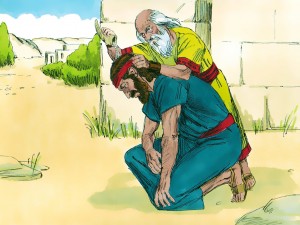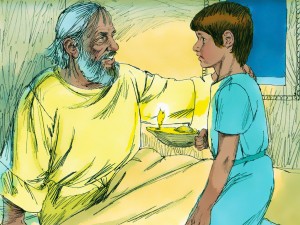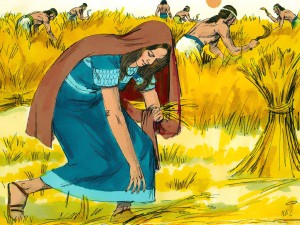The Four Seasons (Italian: Le quattro stagioni) is a set of four violin concertos by Antonio Vivaldi. Composed around 1720, The Four Seasonsis Vivaldi’s best-known work, and is among the most popular pieces in the Baroque music repertoire. The texture of each concerto is varied, each resembling its respective season. For example, “Winter” is peppered with silvery pizzicato notes from the high strings, calling to mind icy rain, whereas “Summer” evokes a thunderstorm in its final movement, which is why the movement is often called “Storm” (as noted in the list of derivative works).
Las cuatro estaciones (italiano: stagioni Le quattro) es un conjunto de cuatro conciertos para violín de Antonio Vivaldi. Compuesta en 1720, The Four Seasons es la obra más conocida de Vivaldi, y es uno de las piezas más populares del repertorio de la música barroca. La textura de cada concierto es variado, cada uno se asemeja a su respectiva temporada. Por ejemplo, “Invierno” está salpicada de notas pizzicato plateadas de las altas cadenas, recordando lluvia helada, mientras que “Verano” evoca una tormenta eléctrica en su movimiento final, por lo que el movimiento es a menudo llamado “Storm” (como se señala en la lista de obras derivadas).
Le Quattro Stagioni (italiano: Le quattro stagioni) è una serie di quattro concerti per violino di Antonio Vivaldi. Composta intorno al 1720, il Four Seasons è opera più conosciuta di Vivaldi, ed è tra i pezzi più popolari del repertorio della musica barocca. La struttura di ogni concerto è molto vario, ogni simile la rispettiva stagione. Ad esempio, “Inverno” è costellata di note pizzicate argentei dalle corde alte, richiamando alla mente pioggia ghiacciata, mentre “Estate” evoca un temporale nel suo movimento finale, che è il motivo per cui il movimento è spesso chiamato “Storm” (come indicato nella l’elenco di opere derivate).
Source: 1 Samuel 8:1-10:27 1 Samuel 8-10:27(Español) 1 Samuele 8-10:27(Italiano)
1 Samuel 8-10:27
Israel Asks for a King
8 When Samuel grew old, he appointed his sons as Israel’s leaders.[a] 2 The name of his firstborn was Joel and the name of his second was Abijah, and they served at Beersheba. 3 But his sons did not follow his ways. They turned aside after dishonest gain and accepted bribes and perverted justice.
4 So all the elders of Israel gathered together and came to Samuel at Ramah. 5 They said to him, “You are old, and your sons do not follow your ways; now appoint a king to lead[b] us, such as all the other nations have.”
6 But when they said, “Give us a king to lead us,” this displeased Samuel; so he prayed to the Lord. 7 And the Lord told him: “Listen to all that the people are saying to you; it is not you they have rejected, but they have rejected me as their king. 8 As they have done from the day I brought them up out of Egypt until this day, forsaking me and serving other gods, so they are doing to you. 9 Now listen to them; but warn them solemnly and let them know what the king who will reign over them will claim as his rights.”
10 Samuel told all the words of the Lord to the people who were asking him for a king. 11 He said, “This is what the king who will reign over you will claim as his rights: He will take your sons and make them serve with his chariots and horses, and they will run in front of his chariots. 12 Some he will assign to be commanders of thousands and commanders of fifties, and others to plow his ground and reap his harvest, and still others to make weapons of war and equipment for his chariots. 13 He will take your daughters to be perfumers and cooks and bakers. 14 He will take the best of your fields and vineyards and olive groves and give them to his attendants. 15 He will take a tenth of your grain and of your vintage and give it to his officials and attendants.16 Your male and female servants and the best of your cattle[c] and donkeys he will take for his own use. 17 He will take a tenth of your flocks, and you yourselves will become his slaves. 18 When that day comes, you will cry out for relief from the king you have chosen, but the Lord will not answer you in that day.”
19 But the people refused to listen to Samuel. “No!” they said. “We want a king over us. 20 Then we will be like all the other nations, with a king to lead us and to go out before us and fight our battles.”
21 When Samuel heard all that the people said, he repeated it before the Lord. 22 The Lord answered, “Listento them and give them a king.”
Then Samuel said to the Israelites, “Everyone go back to your own town.”
Samuel Anoints Saul
9 There was a Benjamite, a man of standing, whose name was Kish son of Abiel, the son of Zeror, the son of Bekorath, the son of Aphiah of Benjamin. 2 Kish had a son named Saul, as handsome a young man as could be found anywhere in Israel, and he was a head taller than anyone else.
3 Now the donkeys belonging to Saul’s father Kish were lost, and Kish said to his son Saul, “Take one of the servants with you and go and look for the donkeys.” 4 So he passed through the hill country of Ephraim and through the area around Shalisha, but they did not find them. They went on into the district of Shaalim, but the donkeys were not there. Then he passed through the territory of Benjamin, but they did not find them.
5 When they reached the district of Zuph, Saul said to the servant who was with him, “Come, let’s go back, or my father will stop thinking about the donkeys and start worrying about us.”
6 But the servant replied, “Look, in this town there is a man of God; he is highly respected, and everything he says comes true. Let’s go there now. Perhaps he will tell us what way to take.”
7 Saul said to his servant, “If we go, what can we give the man? The food in our sacks is gone. We have no gift to take to the man of God. What do we have?”
8 The servant answered him again. “Look,” he said, “I have a quarter of a shekel[d] of silver. I will give it to the man of God so that he will tell us what way to take.” 9 (Formerly in Israel, if someone went to inquire of God, they would say, “Come, let us go to the seer,” because the prophet of today used to be called a seer.)
10 “Good,” Saul said to his servant. “Come, let’s go.” So they set out for the town where the man of God was.
11 As they were going up the hill to the town, they met some young women coming out to draw water, and they asked them, “Is the seer here?”
12 “He is,” they answered. “He’s ahead of you. Hurry now; he has just come to our town today, for the people have a sacrifice at the high place. 13 As soon as you enter the town, you will find him before he goes up to the high place to eat. The people will not begin eating until he comes, because he must bless the sacrifice; afterward, those who are invited will eat. Go up now; you should find him about this time.”
14 They went up to the town, and as they were entering it, there was Samuel, coming toward them on his way up to the high place.
15 Now the day before Saul came, the Lord had revealed this to Samuel: 16 “About this time tomorrow I will send you a man from the land of Benjamin. Anoint him ruler over my people Israel; he will deliver them from the hand of the Philistines. I have looked on my people, for their cry has reached me.”
17 When Samuel caught sight of Saul, the Lord said to him, “This is the man I spoke to you about; he will govern my people.”
18 Saul approached Samuel in the gateway and asked, “Would you please tell me where the seer’s house is?”
19 “I am the seer,” Samuel replied. “Go up ahead of me to the high place, for today you are to eat with me, and in the morning I will send you on your way and will tell you all that is in your heart. 20 As for the donkeysyou lost three days ago, do not worry about them; they have been found. And to whom is all the desire of Israel turned, if not to you and your whole family line?”
21 Saul answered, “But am I not a Benjamite, from the smallest tribe of Israel, and is not my clan the least of all the clans of the tribe of Benjamin? Why do you say such a thing to me?”
22 Then Samuel brought Saul and his servant into the hall and seated them at the head of those who were invited—about thirty in number. 23 Samuel said to the cook, “Bring the piece of meat I gave you, the one I told you to lay aside.”
24 So the cook took up the thigh with what was on it and set it in front of Saul. Samuel said, “Here is what has been kept for you. Eat, because it was set aside for you for this occasion from the time I said, ‘I have invited guests.’” And Saul dined with Samuel that day.
25 After they came down from the high place to the town, Samuel talked with Saul on the roof of his house.26 They rose about daybreak, and Samuel called to Saul on the roof, “Get ready, and I will send you on your way.” When Saul got ready, he and Samuel went outside together. 27 As they were going down to the edge of the town, Samuel said to Saul, “Tell the servant to go on ahead of us”—and the servant did so—“but you stay here for a while, so that I may give you a message from God.”
10 Then Samuel took a flask of olive oil and poured it on Saul’s head and kissed him, saying, “Has not the Lord anointed you ruler over his inheritance?[e] 2 When you leave me today, you will meet two men near Rachel’s tomb, at Zelzah on the border of Benjamin. They will say to you, ‘The donkeys you set out to look for have been found. And now your father has stopped thinking about them and is worried about you. He is asking, “What shall I do about my son?”’
3 “Then you will go on from there until you reach the great tree of Tabor. Three men going up to worship God at Bethel will meet you there. One will be carrying three young goats, another three loaves of bread, and another a skin of wine. 4 They will greet you and offer you two loaves of bread, which you will accept from them.
5 “After that you will go to Gibeah of God, where there is a Philistine outpost. As you approach the town, you will meet a procession of prophets coming down from the high place with lyres, timbrels, pipes and harpsbeing played before them, and they will be prophesying. 6 The Spirit of the Lord will come powerfully upon you, and you will prophesy with them; and you will be changed into a different person. 7 Once these signs are fulfilled, do whatever your hand finds to do, for God is with you.
8 “Go down ahead of me to Gilgal. I will surely come down to you to sacrifice burnt offerings and fellowship offerings, but you must wait seven days until I come to you and tell you what you are to do.”
Saul Made King
9 As Saul turned to leave Samuel, God changed Saul’s heart, and all these signs were fulfilled that day.10 When he and his servant arrived at Gibeah, a procession of prophets met him; the Spirit of God came powerfully upon him, and he joined in their prophesying. 11 When all those who had formerly known him saw him prophesying with the prophets, they asked each other, “What is this that has happened to the son of Kish? Is Saul also among the prophets?”
12 A man who lived there answered, “And who is their father?” So it became a saying: “Is Saul also among the prophets?” 13 After Saul stopped prophesying, he went to the high place.
14 Now Saul’s uncle asked him and his servant, “Where have you been?”
“Looking for the donkeys,” he said. “But when we saw they were not to be found, we went to Samuel.”
15 Saul’s uncle said, “Tell me what Samuel said to you.”
16 Saul replied, “He assured us that the donkeys had been found.” But he did not tell his uncle what Samuel had said about the kingship.
17 Samuel summoned the people of Israel to the Lord at Mizpah 18 and said to them, “This is what the Lord, the God of Israel, says: ‘I brought Israel up out of Egypt, and I delivered you from the power of Egypt and all the kingdoms that oppressed you.’ 19 But you have now rejected your God, who saves you out of all your disasters and calamities. And you have said, ‘No, appoint a king over us.’ So now present yourselves before the Lord by your tribes and clans.”
20 When Samuel had all Israel come forward by tribes, the tribe of Benjamin was taken by lot. 21 Then he brought forward the tribe of Benjamin, clan by clan, and Matri’s clan was taken. Finally Saul son of Kish was taken. But when they looked for him, he was not to be found. 22 So they inquired further of the Lord, “Has the man come here yet?”
And the Lord said, “Yes, he has hidden himself among the supplies.”
23 They ran and brought him out, and as he stood among the people he was a head taller than any of the others. 24 Samuel said to all the people, “Do you see the man the Lord has chosen? There is no one like him among all the people.”
Then the people shouted, “Long live the king!”
25 Samuel explained to the people the rights and duties of kingship. He wrote them down on a scroll and deposited it before the Lord. Then Samuel dismissed the people to go to their own homes.
26 Saul also went to his home in Gibeah, accompanied by valiant men whose hearts God had touched. 27 But some scoundrels said, “How can this fellow save us?” They despised him and brought him no gifts. But Saul kept silent.



